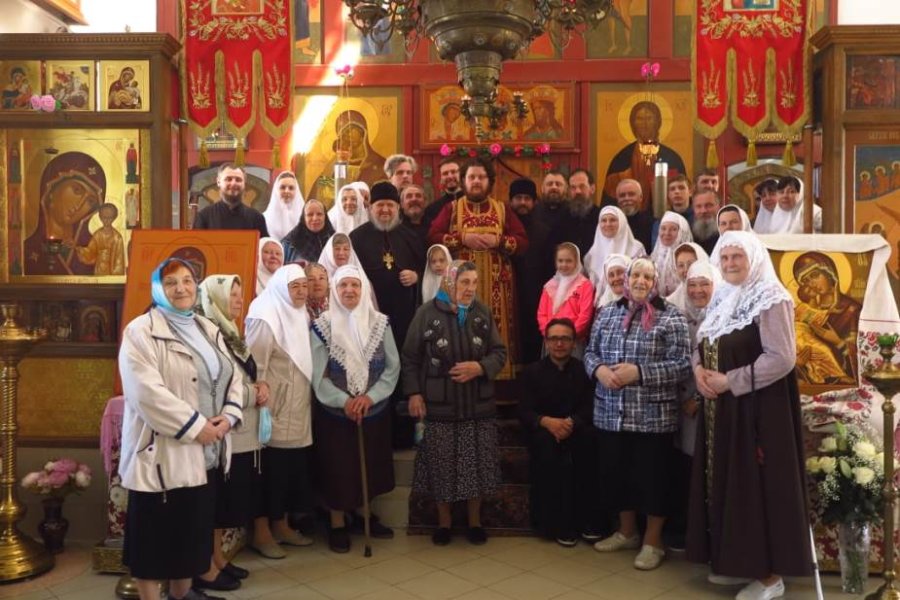
In addition to Mikhailova Sloboda and Kurovskoe, there is an old rite parish in the village of Ostashovo, Voskresensky district, near Moscow. It is dedicated to the Vladimir Icon of the Virgin Mary. Hieromonk Antony (Anenko) has been the rector of the church here for more than 10 years. I had a chance to be here at the parish feast when the predecessor of fr. Antony was here. A few days later, one of the participants of the trip wrote to the rector at the time about what embarrassed her, namely, the presence of several Latin-styled icons in the church and some omissions during the service. The response was quite harsh. The possibility of coming in the future became problematic. This year I felt an overwhelming desire to be sure to visit Ostashovo on the feast day, especially as it was such a great anniversary.
"Are you on your way?" - calls the parishioner who ordered a car for me. I answered in a faint voice: "We're on our way." I was later told how, on hearing my weak voice, she threw up her hands: "How can he drive so far with obvious illness?!" All persuasion was in vain. With all the strength of my soul I felt a desire to be in Ostashovo on such a momentous day. We arrived three hours later, just in time for the service.
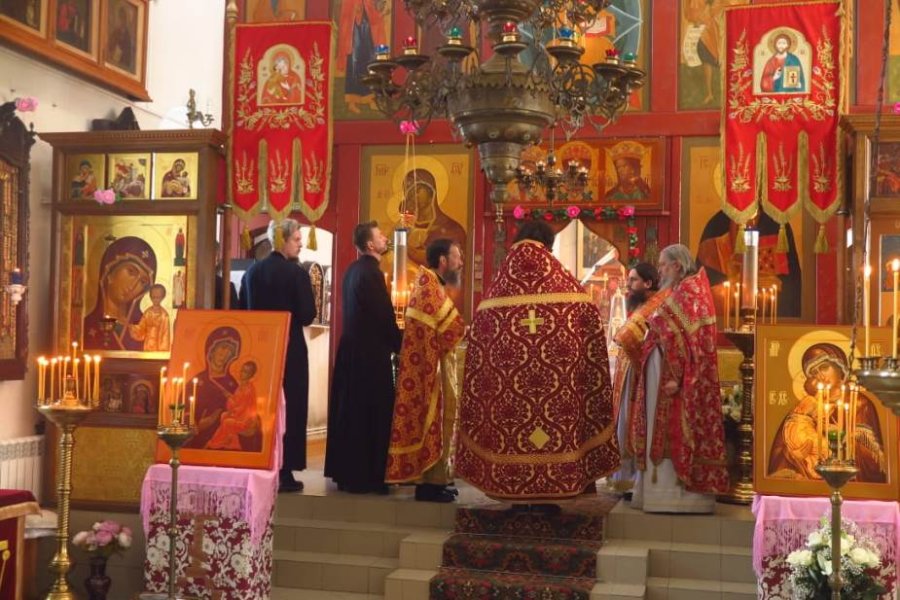
The exterior of the church has changed little, except for a plaque on the wall with the names of the five repressed clergymen. Inside the church, the changes were striking: there were many newly painted icons, shrouds under the icons, beautiful lamps and candlesticks. A handwritten text hangs in the narthex: "Rules of behaviour in the church". I remembered: whoever crosses inappropriately, not according to the rules, violates the commandment of the Ten Commandments: "Thou shalt not take the name of God in vain".
The great Vespers, the little Compline and Matins were sung and recited in an unhurried and measured manner. Every word from the liturgical books that was sung or read reached the ears and minds of the congregation. I thought to myself: if services were conducted in such a way everywhere, the complaints about the obscurity of the liturgical language would disappear. Recently, in a regional centre near the railway station, I went into a newly built cathedral and could not understand a single word of the verse sung by a male quartet from the balcony.
As always happens when you visit other churches - whether they are Old Believer or Edinoverie - you notice something new to you. You start to see whether you are missing something or whether there is something subjective there. And in the case of Edinoverie, something borrowed from the New Rite practice.
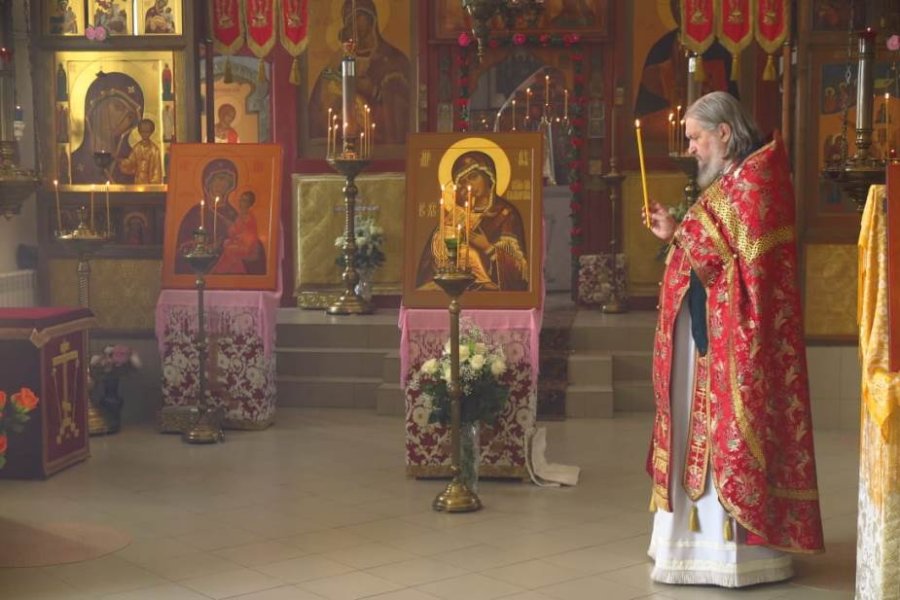
The altar in its white vestments looked like a big lump of sugar. A lot of old icons. There were seven candlesticks besides seven oil lamps, which was the first time I had ever seen such a thing. When opening the Holy Gates, and even the curtain on it, the rector always crossed himself. Before the small entrance he censed the front of the throne three times. At the Litia up to ten verses were sung - we only sing the first, as well as the "Glory" and the "Both now and forever", and the rest are read. At Danilov Monastery only one verse is sung at all.
At a certain point I began to fear that I might once again "go into knockdown" - that I might not faint, as I did recently. I feared to get hurt, to go tumbling down the steps from the high ambo. When I was a novice in the Pochaevskaya Lavra (1979-80), preaching from the ambo in Russian and Ukrainian, I liked to give bright examples, analogies from life, showing short existence of the earth (like: "Before a boat has sailed from one shore, another shore is already visible", etc.). It is only in recent years, as illnesses have multiplied, as I reflect on the mortal hour, that I perceive these things in essence and not just as beautiful metaphors.
How many lofty words in praise of the Mother of Light were spoken during the service! Whenever possible, Father Anthony would go to help chant in the choir, and I would say the Litanies and exclamations in the altar. Father Antony was very fond of the Euchologion, which belonged to Father Vasily Kuznetsov, who served in the area before the revolution. After each chorus he bowed to "My soul magnifies the Lord," which was the first time I had ever seen him do so. Gloria in excelsis sounded powerfully - it turned out that the pilgrims from Kuznetsk, Penza Oblast, led by hieromonk Varsonofy, had "lent a helping hand".
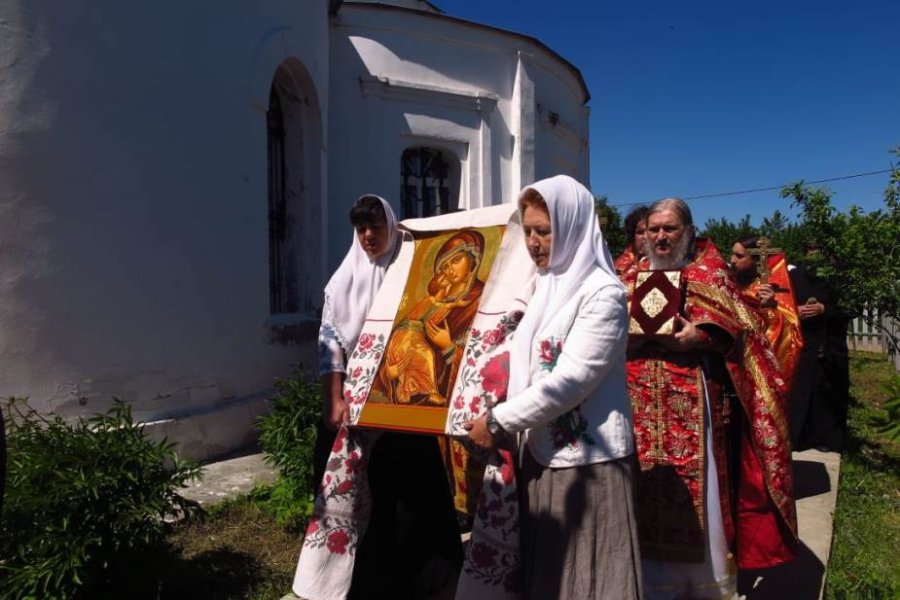
The meal after the end of the service combined two sources of viands - the ones we brought with us and local supplies. We especially liked the pickled carrots, sultana cakes and kvass.
Father Antony is very hospitable, a jack-of-all-trades (beekeeper, kvass maker, vegetable grower, etc.). In Father Antony's cell we looked at photographs of Old Believers and his relatives, ancient engravings. Father Antony was born in the Orenburg region. At a young age he was baptized with triple immersion by archimandrite Serafim (Tomin). There was a mixture of villages in father Antony's homeland, where people of different nationalities lived. There were Old Believers' villages where mainly Beglopopovtsy (Old Belivers who accepted runaway priests) lived. Their burial customs particularly appealed to him. Father Antony turned out to be a very interesting narrator. Especially memorable was his story about how simply and movingly the Mordovians believed and prayed. I thought: "Out of dozens of potential candidates for a Edinoverie bishop, he is probably the most suitable candidate: simple, sociable, zealous, gifted, sophisticated. I, for example, am a completely useless figure in this respect, a "worked-out piece of material". I am completely unsuitable, neither for my age nor for my health, and the labels of "politicized hegumen", "famous anti-individual taxpayer number," and so on are stuck to me.
I spent the night in the "gatehouse," as Father Antony called one of the rooms in his wooden house. There was a whole iconostasis, many books and household items in the holy corner: a spindle, a large frying pan, a wooden laundry boat and even a balalaika, as well as several "unidentified objects" - objects from peasant life whose purpose is not quite clear to us, city dwellers.
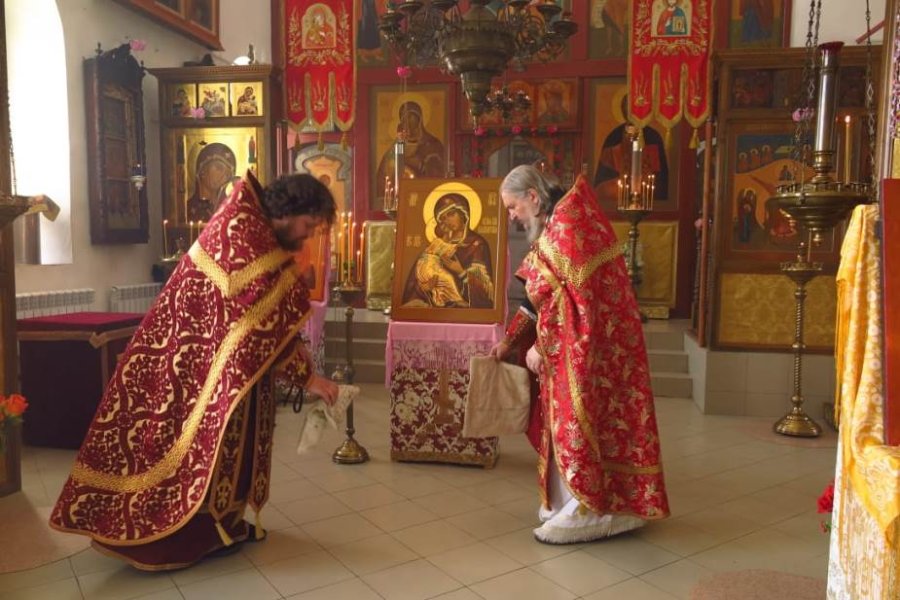
At 6.10 in the morning I was already in the church - I thought I was the first to arrive, but it turned out that Fathers Antony and Varsonofy had already read the Communion Hours and lit the lamps on all the candlesticks. During the Entrance Prayers the purpose of the small cast icons on the pillars of the Holy Gates was made clear - to kiss each of them after an appropriate prayer. Prayers were read before the Liturgy at the altar by each priest separately and silently (we have them read aloud and alternately by all the servants). While reading the synodics, I noted that a large part of the names in them were written in Slavonic script. Father Antony showed a synodicon with the names of Old Believers' Neokruzhnik (historical schism from Belorkinitskaya hierarchy, now extinct) bishops and priests that belonged to their relatives. One synodicon contained the names of Patriarch Pimen (Moscow Patriarchate), and below that of Metropolitans Alimpy and Andrian (Belokrinitskaya Old Believers). Some of the synodicons contained names in the genitive case and others in the dative case, a manifestation of the difference between "neophytes" and "natives". At the Great Entrance the concelebrating priests at the three commemorations "may the Lord God remember you all" simultaneously blessed with their crosses according to the new rite, if I'm not mistaken. After the prayer behind the ambo we began a moleben, or rather two molebens - Paschal and to the Mother of God (the refrain to the Mother of God was sung by the priests in the altar). After the reading of the Gospel the procession of priests, carrying the censer, the Gospel and the cross, went into the middle of the church. The water blessing service began. With the singing of the first words of the seventh song of Paschal canon the procession started. Unusual was the absence of bell ringing. Parish feasts in our country end with the proclamation of wishing many years - for some reason there were none here. Despite these omissions, in general the service was at a very high level (it ended at half past midnight). As always happens during a long service in an old rite, all discomfort and tiredness completely vanished by the end of the service. I couldn't stand it, so I went up to the bell tower and had a bit of a rattle.
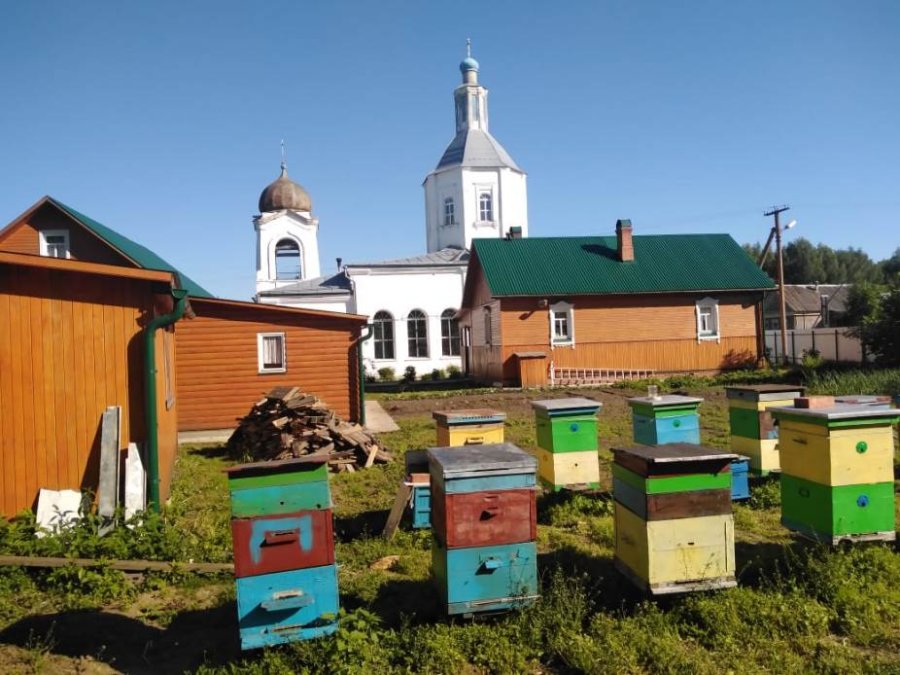
The meal did not begin immediately - Father Antony was having some problems with the bees. Large, bear-like, like in a famous cartoon, either he was chasing a swarm of bees or they were chasing him. "Pray and start the meal without me," he said as he ran past. I immediately went into the refectory. To my surprise, no one else did. That sort of thing is unthinkable here in Bersenevka (fr. Kirill's parish) - you'll quickly get told off. After the prayer before dinner, I whispered to Fr. Antony: "I'll be waiting for your signal to start my speech". I was given the signal, but it turned out that speeches were not a custom here. The homilies were not read either during the meal. It was free-flowing; there was no organized, circular presentation as we do at Bersenevka. We sang two spiritual poems: about Boyarina Morozova and "Lord have mercy, Lord forgive".
Hegumen Kirill (Sakharov), rector of the Church of St. Nicholas on Bersenevka, member of the Union of Russian Writers.
Source: ruskline.ru


